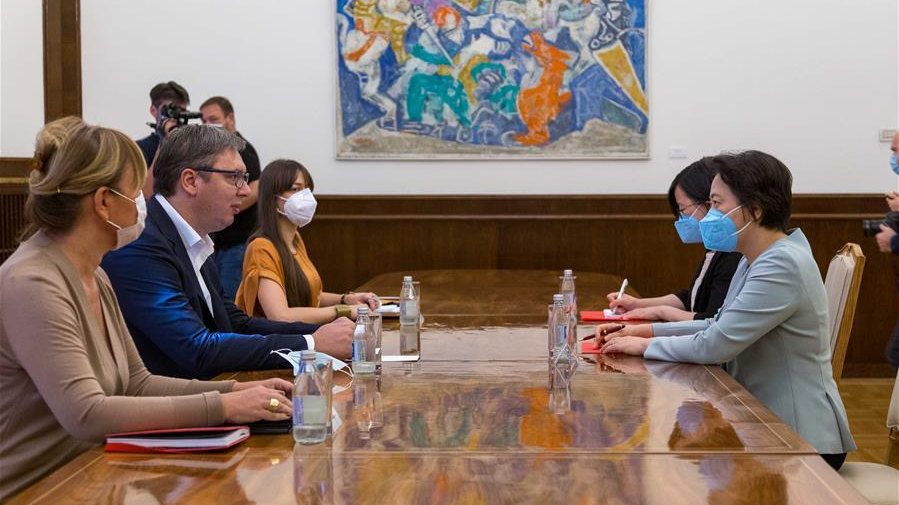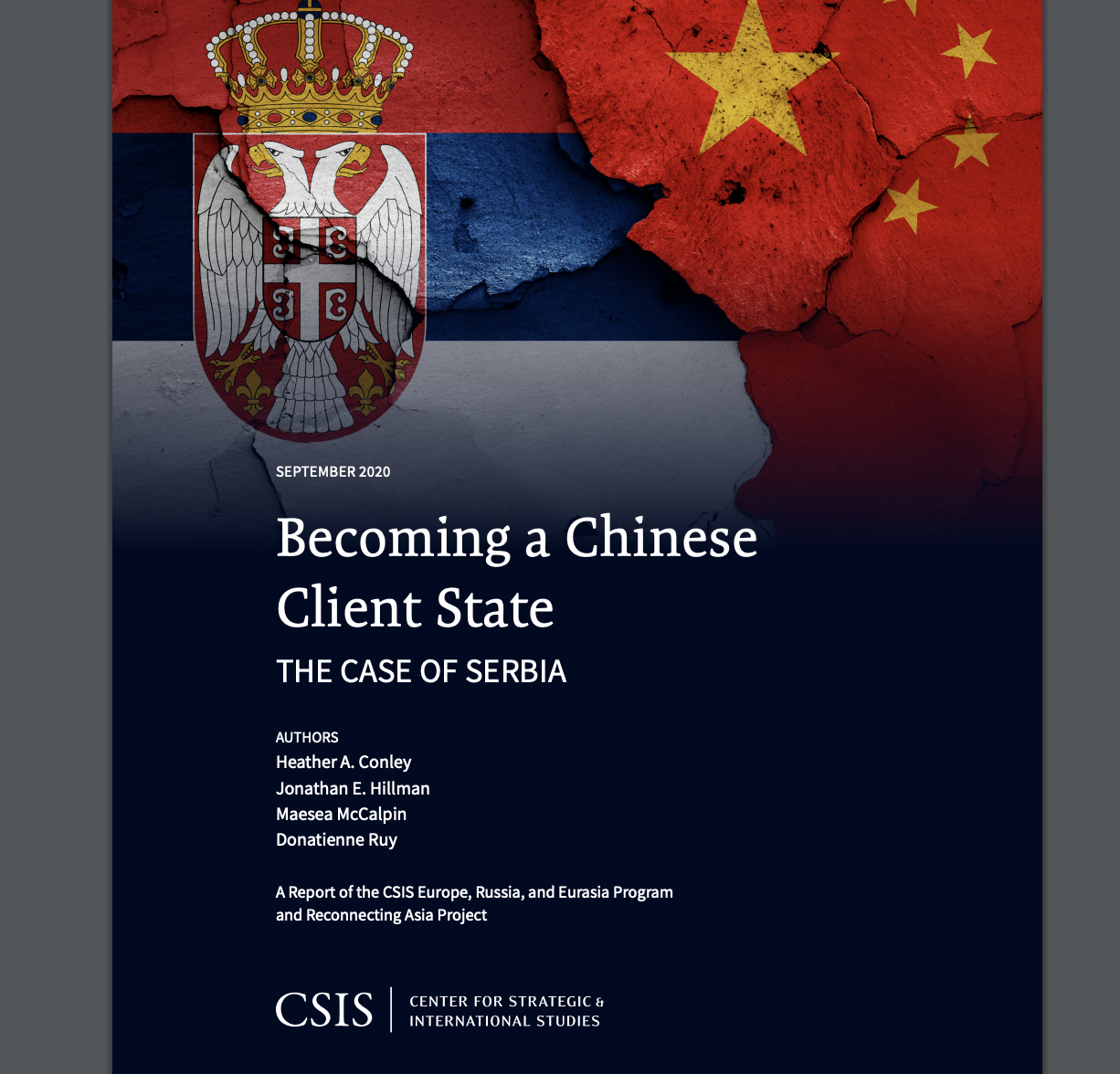
Serbian President Aleksandar Vucic meets with Chinese Ambassador to Serbia Chen Bo at the presidency building in Belgrade, Serbia, on September 11, 2020. /Xinhua
Serbian President Aleksandar Vucic meets with Chinese Ambassador to Serbia Chen Bo at the presidency building in Belgrade, Serbia, on September 11, 2020. /Xinhua
Editor's note: Bradley Blankenship is a Prague-based American journalist, political analyst and freelance reporter. The article reflects the author's opinions, and not necessarily the views of CGTN.
A September report by the Center for Strategic and International Studies (CSIS) titled "Becoming a Chinese Client State: The Case of Serbia" reflects a very regrettable and, I would say, wholly unproductive way of framing the new era of international relations the world is entering. Lost in the jargon is a deeply ingrained view that international relations is zero-sum and, moreover, that Western countries are entitled to respect and influence across the world. The report lacks any serious qualitative analysis of exactly why Serbians hold a favorable view of China.
The authors lament that nearly 40 percent of Serbians think China, followed by the European Union (EU) at about 18 percent and Russia at about 15 percent, gives the most aid to their country, according to a March poll. They note that in reality the EU, followed by Germany, the U.S. and United Nations (UN) give the most aid, in terms of euro amount. Unfortunately the report fails to even explore how it could be possible that with such a discrepancy this could actually be possible.
They do note, however, that the Serbian government lauded China for its pivotal role this spring in providing key medical supplies to the country during the initial coronavirus outbreak, but drew attention to the fact that the EU gave significant amounts of financial aid. The EU may have given more quantitative aid that will be useful in managing the economic fallout from COVID-19, but it was perhaps less consequential in a qualitative way at the time the poll was conducted.
For example, on March 15 Serbia's President Aleksandar Vucic angrily told the EU "thanks for all your help so far, we'll be taking it from here." The reason for the Serbian president's harsh words during his speech was the fact that the EU was limiting its sales of medical supplies to third countries – and this was just weeks after the foreign ministers of the Visegrad Four (V4) and Western Balkans had met in Prague, reaffirming a commitment to EU integration of the region. Western countries have always urged Serbia to buy their goods, allow their investors market access, but when Serbia needed medical supplies, Serbian money was apparently worthless.
The report also notes China's activities by sector: about 31 percent toward transportation, 13 percent to energy, 9 percent to health and human services, 20 percent to information and communications technology and 20 percent to manufacturing – all crucial to Serbia's long-term development. These are, indeed, highly visible sectors of investment as the report notes. No doubt whenever a local drives across Belgrade's Pupin Bridge, for example, they're reminded of China's impact on their daily lives.
These sectors specifically give Serbia a leg up in economic advancement by developing the country's productive forces into the 21st century. Western investment is so often tied to programs that benefit Western multinational corporations, capital exportation and hinge on "support for civil society," which if we eliminate the euphemism is just outright foreign interference.

The cover of the CSIS report
The cover of the CSIS report
The activities of the United States Agency for International Development (USAID) particularly demonstrate where these priorities for Serbia's development lie. According to the agency's "Dollar to Results" page on Serbia, in 2019 the agency spent over 21 million U.S. dollars in programs that overwhelmingly center on "government and civil society" and "business and other services" – foreign interference, if we may be so blunt. This is exactly the framing that would take place if China was spending tens of millions of dollars per year "training justice personnel,""assisting non-state news outlets" and "improving management practices or technologies."
Western countries are trying to create a relationship of dependence that's predicated on seeing the exact changes that they want in Serbia's society, ones that are no doubt expedient to their political and business interests, and that is especially true for the United States in particular. There is an old phrase that perfectly encapsulates the qualitative difference here: "Give a man a fish and you feed him for a day. Teach a man to fish and you feed him for a lifetime."
In response to improving Sino-Serbian ties the report concludes, "The United States and Europe, however, cannot allow these developments to remain unaddressed" and recommends that "the United States (and its allies in the European Union) must pursue a strategy that simultaneously exposes the untruths and contradictions of Chinese economic and political engagement; mitigates current and future Chinese influence activities; and presents a positive transatlantic agenda that highlights transparent investment, economic benefit, rigorous oversight and accountability, and civil society engagement."
It recommends that a "specific U.S.-EU education campaign should be organized and executed to expose the negative impacts of Chinese economic activities in Serbia using a variety of media tools," which also includes funding think tanks, academics and journalists to push back against alleged Chinese disinformation. It also recommends another campaign to highlight the "societal benefits of the grants the European Union and the United States provide to Serbia."
The problem here is that it's not a zero-sum game. Countries should not invest in other countries with the express expectation of subordination and fealty, instead they should work toward win-win cooperation that promotes independence and self-reliance. To that end Western countries should do more to invest in visible, consequential forms of aid and investment that create serious advances in human development instead of launching a propaganda barrage against their perceived adversaries.
(If you want to contribute and have specific expertise, please contact us at opinions@cgtn.com.)